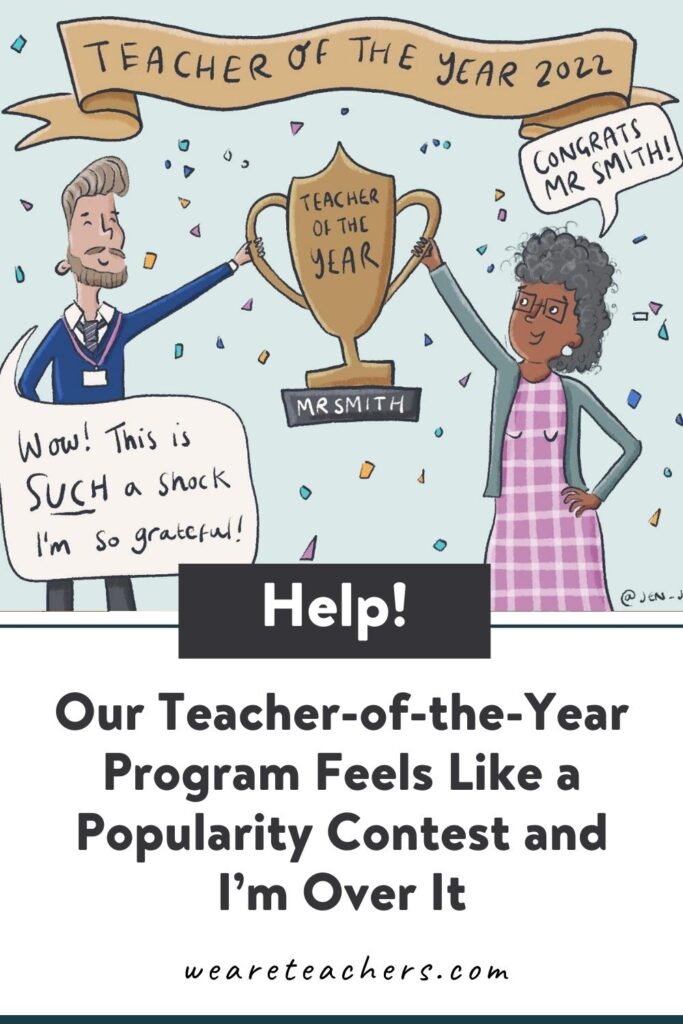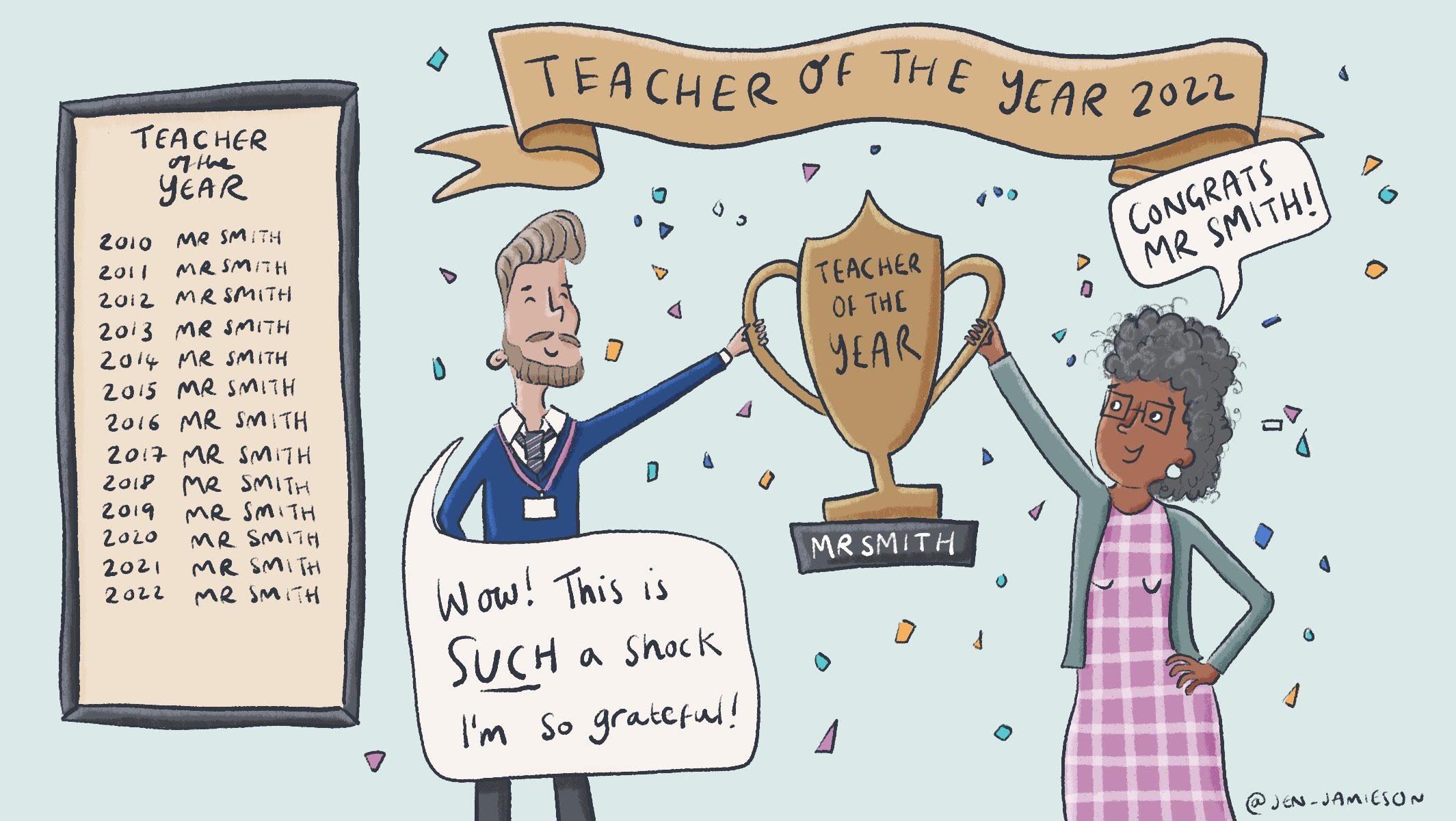Dear WeAreTeachers:
I’ve been a fifth-grade teacher for the past decade, all at my current school. I’m active in the PTA and on various school committees, and parents and kids love me. I didn’t get into this job for the recognition, but I can’t pretend it doesn’t hurt to get passed over time and again for Teacher of the Year. This year, it went to the principal’s “favorite.” No surprise there, but when did Teacher of the Year become such a popularity contest? —Who You Know Matters
Dear W.Y.K.M.,
At this time in the school year, educators all over the nation are paying attention to the ubiquitous Teacher of the Year recognition at schools and districts. Deep down we ALL want to feel seen, heard, and felt. Most everybody wants attention whether they admit it or not. So it’s understandable that you feel passed over and frustrated that teachers are selected based on being well-liked. This is something we all have observed or experienced ourselves.
And please try not to base your worth on external recognition. Basing self-worth on achievements has its pitfalls. “While it’s normal for your accomplishments to make you feel good, basing your entire self-worth on your achievements is like building your house on an unsteady foundation. You’ll need to experience repeated success in order to feel good about yourself—and that’s hard to maintain over the long haul. When your entire self-worth depends on your achievements, you’ll avoid doing things where you could fail.”
Not getting an award does not invalidate the work you are doing day in and day out as an educator. Focus on how your kids are thriving and the way you connect with your families. Whether you receive Teacher of the Year or not, you are impacting multitudes of kids and families by the learning conditions you create. The fact that you weren’t Teacher of the Year might mean that you don’t fit into the compliance box, and that’s not necessarily a bad thing.
Maryland’s Teacher of the Year, Brianna Ross, emphasizes how teaching “is hard, hard, hard, hard work … and it is often a thankless job, even when you are the Teacher of the Year.” Teaching involves so much work that often goes unrecognized. And so often laypeople believe they are experts in education just because they were students themselves. Teaching is valuable and it’s exhausting, and most people just don’t realize the complexity, intentionality, and hard work involved in helping every child thrive every day.
Teaching is a great example of one of life’s paradoxes. A paradox is a “seemingly absurd or self-contradictory statement or proposition that when investigated or explained may prove to be well-founded or true.” So maybe we can say congratulations on not being chosen for the Teacher of the Year award at your site. You are removed from the drama of this popularity contest, and it sounds like that’s a good place to be.
Dear WeAreTeachers:
When I returned from a short absence, one of my trusted students told me two boys were vaping in the back of the room when the sub was there. I talked to my admin and he pulled the two kids out of class to talk. One boy confessed immediately. His story matched up with the witnesses. The other boy denied everything. The boy who confessed will be in “On Campus Isolation” for the rest of the year. This is the first time he’s been in trouble. It seems so harsh. And the boy who claimed innocence has no consequences. To make this issue even more upsetting, the boy who confessed is from a low-income area and is African American. The student who says he didn’t do anything wrong is from an affluent area, is white, and takes honors classes. I’m upset! What should I do? —Who Vapes in Class Anyway?
Dear W.V.I.C.A.,
Thanks for bringing up vaping, which has become widespread on our middle school and high school campuses. I have personally seen kids vaping in school without trying to hide it while others puff and then exhale into their sweatshirts inside classrooms. As a parent, I asked my daughter’s high school how they are addressing the vaping issue, and I didn’t even get a response.
So, what’s the big deal about vaping, especially if so many people are doing it nowadays? Well, concentrated nicotine is extremely addictive and harmful, especially to teens’ developing brains. Tobacco Free CA states, “The tobacco industry uses fun flavors and tech devices to hook kids on nicotine. Why kids? A developing brain is easier to addict.”
Our kids are being targeted and bombarded with flavored vaping products, such as Blue Razz and Cotton Candy. The flavors entice the kids and then the nicotine changes the way the brain develops, which has a negative effect on attention and learning. This addictive substance also increases feelings of anxiety, mood swings, and general irritability. Being a teenager comes with its own challenges. Adding a vaping addiction doesn’t help.
You also brought up the troubling issue of bias related to the students’ consequences and discipline related to the vaping incident. One student admitted to vaping while the other denied it. Both kids had the same witnesses. So, what’s different? The student demographics that you mention seem to be an issue. Sometimes educators have conscious and unconscious biases that affect logical consequences related to behavioral issues. The white honor student received the benefit of the doubt, while the student who is perceived as a less-engaged learner and also is a person of color received a severe punishment. Black students are disproportionately overrepresented with suspensions. It’s understandable that you feel upset! It’s also important for you to speak up and advocate.
The in-school suspension for the rest of the year does seem isolating and harsh for a first-time offense. Consider talking to other teachers who also work with these students to learn their ideas and opinions about what happened. Also, making the effort to set up a one-on-one meeting with the principal will be helpful. You can share that you’d like to talk about what happened with the students who vaped and the importance of providing logical consequences for both kids involved based on reliable witnesses. Maybe the students need to do some research on vaping, addiction, and the dangers to the growing adolescent brain, in the hopes that this can be a learning opportunity. Also, involve the parents so that they can actively engaged in disrupting the addiction. There are group classes that many of us parents have found to be enlightening and helpful.
Dear WeAreTeachers:
I’m a parent and I can’t believe what my son’s kindergarten teacher just said to me. Yes, my son is high-energy. Yes, he has lots to learn. And yes, he can be disruptive. But I’ve been an engaged parent, helpful at the school, and also worked closely with the teacher. When we had our parent conference, the teacher listed thing after thing that my son is struggling with. At the end, I asked her if she could please share what he IS doing well so we could at least have something to celebrate. The teacher actually said, “I don’t have anything positive to share.” I was stunned. My heart was racing. I got up and said thank you and walked out. Now, what do I do ? —Big Time Baffled
Dear B.T.B.,
I’m so sorry that you had a teacher leave you in a discouraged state of mind and heart. This situation reminds me of the quote by Haim Ginott: “I’ve come to a frightening conclusion that I am the decisive element in the classroom. It’s my personal approach that creates the climate. It’s my daily mood that makes the weather. As a teacher, I possess a tremendous power to make a child’s life miserable or joyous. I can be a tool of torture or an instrument of inspiration. I can humiliate or heal. In all situations, it is my response that decides whether a crisis will be escalated or de-escalated and a child humanized or dehumanized.” What aspect of this quote resonates with you? Humiliate or heal?
Honestly, it takes more effort to resist saying SOMETHING, ANYTHING positive. How hard would it be to find one or two things that your son is doing well or at least making positive progress with? What we focus on is what we grow. Yes, we need honest feedback from our kids’ teachers, but saying, “I don’t have anything positive to share with you” is just not OK.
I know it’s nearing the end of the year, and you probably just want to move on and look forward to a break from this hostile approach. But I would circle back with the teacher and ask for a follow-up meeting to focus on what your son is approximating. Share how you want to encourage him over the summer as you work on some of his emerging skills. Your effort to meet again with your child’s kinder teacher may help bring about some reflection on behalf of the teacher and, hopefully, positive change. Spirit squashing needs to stop.
The American Federation of Teachers reminds us of the power of the parent-teacher relationship. “Positive parent-school communications benefit parents. The manner in which schools communicate and interact with parents affects the extent and quality of parents’ home involvement with their children’s learning.”
Do you have a burning question? Email us at askweareteachers@weareteachers.com.
Dear WeAreTeachers:
I’m a 24-year-old high school teacher. Today, one of my 18-year-old female students stopped me after class, waited until everyone left, and said, “I think I have a crush on you.” I played it cool and asked her to continue coming to my class (she immediately said she was too embarrassed to do so). In a way, I dismissed her comment completely. The only reason I felt bad is that she was shaking and nervous. Do you agree that her comment is wildly inappropriate? Should I have discussed it with her or reported it to someone?Want more advice columns? Visit our Ask WeAreTeachers hub.


